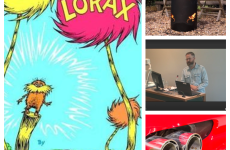Note: Fast & Curious will be a new weekly feature in which The Spectator will take a brief look at a number of stories that piqued its interest during the week.
Oh Readers! Oh Lovers of Books!

The Photographer’s Last Picture, Sean Howard, Gaspereau Press, 2016
First and foremost, Spectator contributor Sean Howard has published a new book with Gaspereau Press (which also published his earlier poetry collection, Incitements).
Howard describes The Photographer’s Last Picture as “an experimental meditation in poetry and prose on twenty pictures from Colliers’ Photographic History of the European War (1916).”
I know you must not judge a book by its cover, but it’s hard to ignore how beautiful this book is (although it’s not surprising, Gaspereau Press does wonderful work).
The Spectator will be publishing a review, but I wanted to mark the book’s arrival, in part because publication of a book is such a milestone for an author and in part because Howard has been such a pillar of support to The Spectator. I’ve been honored to publish his monthly columns and I congratulate him wholeheartedly on his accomplishment. Bravo!
Positive change postponed

The Positive Change Jar
I have not forgotten my promise to check in monthly to monitor progress on CBRM Mayor Cecil Clarke’s “100 More Positive Changes for CBRM.” (I’m interested in all of them, of course, but in numbers 6, 9, 24, 35, 41, 68 and 82 in particular.)
However, I see from the Cape Breton Post that the October floods have thrown the mayor off schedule—his positive change plan has been deferred to the December meeting to give council more time to “digest” it. (And may I just say that had I known the plan was edible, I would have had an entirely different take on it.)
Articles of Association
Speaking of “edible,” chew on this: CBRM chief administrative officer (CAO) Michael Merritt says the actual Port of Sydney Development Corporation board will probably not be in place until the beginning of the next fiscal year—read, next April.

CBRM CAO Michael Merritt
“It will take time. There’s always a transition period to basically make sure that you are able to hire people, you’re able to get the best, there was an articles of association that was drafted about two years ago … that we’ll be utilizing and updating,” Merritt told the Cape Breton Post.
Right, except that Merritt and Co. have had time — 19 months in fact — to “get the best” people for the Port board. Initial reports suggested the real board would be in place by April 2016, but they pushed that to “after the fall elections” and are now shunting it off another four months. Why does the CBRM continue to flout the articles of association by leaving the mayor and three councilors on the Port board?
And why has that interim board not met since February 2016? (Or if it has met, why has it has not made its minutes public?)
And why is Merritt reminding us of the existence of the articles of association and stressing that the CBRM will be “utilizing” them in appointing the new board? Those of us who pay attention to these things have not forgotten there were articles of association drafted “about two years ago” and we always just assumed they would be “utilized” when it finally came time to appoint the board. (Or “hire” the board? See, now I’m starting to question everything Merritt said. Why would you “hire” people for a volunteer board? And in what way does he plan to “update” the articles of association that he’s never even taken out of the package?)
I don’t know which part of this makes my spidey senses tingle more, but it all bears watching (fortunately, we have a council that seems disposed to watch).
Cape Breton on the CBC
Television’s Land & Sea and radio’s Atlantic Voice are two of my favorite CBC programs, and no wonder — in an era when local news is famously in danger of disappearing, these shows tell stories about Atlantic Canadians.

Grant Haverstock, FireHouse Ironworks.
Last weekend, both featured a documentary called The Come Home from Aways, (the TV version is here) about Maritimers who’ve returned to the region to start their businesses and enjoy their quality of life. One of the featured entrepreneurs was Cape Breton’s Grant Haverstock of FireHouse Ironworks in Whycocomagh (whom I’ve had the pleasure of interviewing and whom I will be interviewing again, as his problems with Destination Cape Breton Association have not gone away). He was profiled along with a Guernsey Cove PEI couple making eyewear for the stars (and others too, of course) and a couple running Wild Caraway, a restaurant and cafe in Advocate Harbor, N.S.
The stories are great generally, but what struck me particularly was the importance of the internet to all three businesses — especially to FireHouse and Fellow Earthlings, the eyewear company, which are able to make a go of it in rural Atlantic Canada because they can sell to customers all over the world. The PEI couple admitted their internet was not as reliable as they might wish, although they make it work.
High-speed broadband is key to this sort of economic development.
And as if that wasn’t enough limelight for us, CBC’s Sunday Edition held us up for inspection this week too. Documentarist Ira Basen focused on Cape Breton University (CBU) to explore the growing financial dependence of Canadian universities on foreign students. It’s a trend we’re actually ahead of the curve on here in Cape Breton, although Basen wouldn’t necessarily consider that a good thing. I was struck by the lack of support in terms of English instruction for these students who are paying through the nose to study at CBU. CBC Information Morning Cape Breton is replaying the documentary over two mornings this week. The response should be interesting.
(In an odd twist of fate, as I sat down to write this I received notification of CBU President David Wheeler’s suspension — with pay — pending the outcome of an investigation into “governance issues.” Vice president and academic provost Dale Keefe, who features prominently in Basen’s documentary, has been appointed acting president.)
And another thing about the CBC…
Jesse Brown, who hosts the Canadaland media criticism podcast, pointed out something about our national broadcaster some weeks ago that has really stuck with me. He noted that the CBC’s online presence is entirely questionable in terms of its mandate as a national “broadcaster.” And he highlighted something I’d noticed but hadn’t really thought about — the ads you have to wait through when you listen to CBC Radio One online. Radio One is ad-free, how can that rule apply to the actual radio broadcast and not to the internet livestream?
Brown also said that CBC podcasts are going after his advertisers (although he’s largely funded through an online crowdfunding source called Patreon, he also flogs what I guess you’d call a “curated” selection of products — ranging from web site templates to beds — at the beginning of each show). It seems completely unfair that Brown, or any other private sector podcaster, should have to compete with the CBC for advertising dollars.
The issue came up during a discussion of the future of journalism in Canada; specifically, what, if anything, the federal government should do to support it. Brown’s take, which I agree with, is that the government can best help journalism in Canada by properly funding the CBC — particularly the regions. But that funding must be tied to a serious consideration of what is — and is not — part of the Corporation’s mandate.
FOIPOP-ular
CBRM municipal clerk Deborah Campbell and I are having another standoff over access to information.

My FOIPOP refund check from the CBRM. Note clever “You’ve Been FOIPOPed!” watermark of my own devising.
I asked for a list of all the sustainability grants that have been awarded by the municipality since the program’s inception. I was told grants awarded in the past two years are listed on the web site but getting a list from other years will necessitate — you guessed it — a FOIPOP to the CBRM Finance Department because the information will require “more than two hours” to gather.
To which I say — again — what kind of record-keeping system are they using at the Civic Centre? Aren’t lists like that supposed to be available at the push of a button these days? Isn’t that why we all love the computers, even though they’ve ruined Trivial Pursuit and allowed people like this to thrive? (That’s a story about two guys who got rich producing fake news, which is clearly the growth segment of this industry.)
I immediately threatened to go tell the Privacy Commissioner, hoping the threat would be enough to make the CBRM back down but it didn’t work. So I really did go tell the Privacy Commissioner and I’m waiting for a response.
If I do have to submit a FOIPOP to get information about grants (information that is public already because, as I pointed out, sustainability grants are not awarded in secret) I have the $5 ready. I just have to cash the refund check I got from my last FOIPOP request.
And while we’re on the subject of FOIPOPs, did you see that CBC story about the CBRM demanding $43,000 to respond to one? Cray cray, right? That would have made a great Spectator story. Oh, wait, it was a great Spectator story — over a month ago.
Frontier Sentinel 2012
In May 2012, the U.S. Navy, U.S. Coast Guard and Canadian Forces conducted an exercise focusing on “mine countermeasures and migrant vessel scenarios” off the east coast of the U.S. and Canada.
The R/V Strait Hunter imitated a migrant vessel right here in Sydney harbor and I found a clutch of U.S. Department of Defense photos on Wikimedia Commons showing what that exercise looked like. The black-clad men in these photos are identified as Royal Canadian Mounted Police officers (according to the Cape Breton Post, the Nova Scotia RCMP was the lead group on the operation). If you’ve had doubts about the “militarization” of Canadian police forces, you really need to have look at these pictures:
[slideshow_deploy id=’4209′]
The Cape Breton Spectator is entirely reader supported, consider subscribing today!







